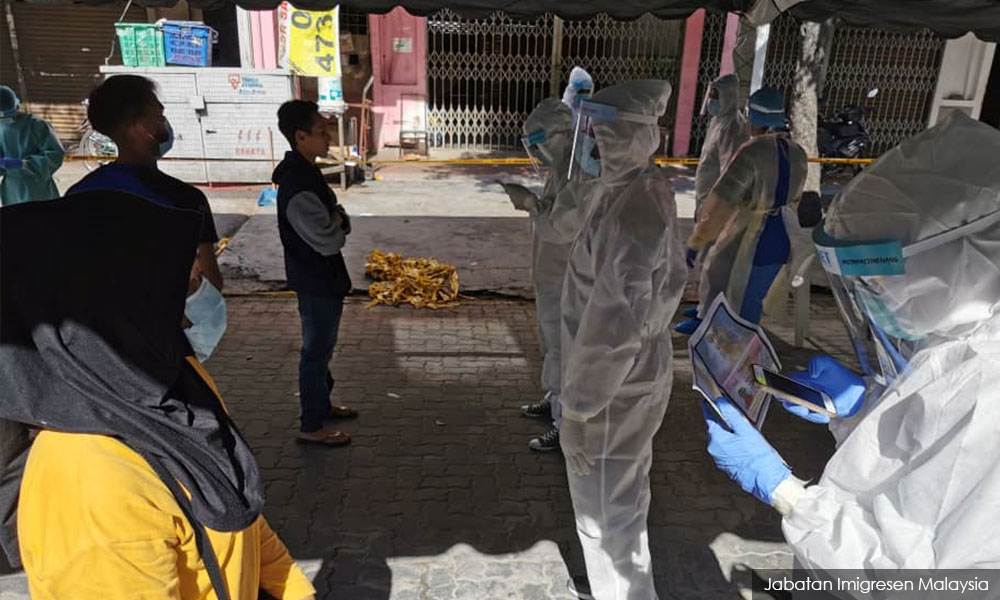MP SPEAKS | The policy of making compulsory testing on foreign workers was well-intended, albeit not thoroughly thought through.
This is a classic case of the failure of problem-solving; when policymakers are really not well in the grasp of what they want to achieve and hence how to strategise to achieve it.
One-off testing of all workers in a workplace is a knee-jerk reaction to the call for more testings done to bend or flatten the curve. Beyond merely isolating them, once found positive, what else needed doing to ensure that the workplace, eg a factory, must not be lockdown by the authority, because of the outbreak?
What we seriously are in need of, is a program called POIS (Preventing outbreak on ignition sites) by Selangor Task Force Covid-19 (STFC).
Admittedly, many large outbreaks of Covid-19 have been reported as arising from large worker communities living in close, confined, quarters. STFC calls this "Ignition sites".
POIS is a cross-sectoral "win-win-win" tripartite partnership between government, the private sector, and NGOs to:
- Encourage the adoption of Enhanced Public Health Measures (EPHM) by employers who have middle-large workforces.
- Strengthen an Early Detection Testing Regime (EDTR), based on rapid and frequent testing, to identify and act on potential cases as quickly as possible.
- Facilitate Health Education, especially Covid-19 related, among workers.
The key to achieving EPHM is premised on establishing "Internal bubbles" as to secure safe workplaces. A "bubble" is a group/cohort of workers, of between five to 30 persons (depending on the nature of manufacturing/construction teams, supervision required, and mix of expertise needed within a team) who are to be kept isolated, to the greatest extent possible, isolated from other workers "bubbles".

Each bubble will work (eg, in a designated assembly line or zone within a construction site), travel (between work and living quarters), and live (eat, sleep/rest, and play) separately from other bubbles. As far as possible, workers from different bubbles should not mix with each other at any time.
In order to minimise "external contact", supporting services (such as catering and cleaning) and deliveries must be put in place. Avoid a situation where there are individuals who mix widely and freely across bubbles and sites and poses threat as potential "super-spreaders".
For catering, consider providing meal options for workers so that they will not need to source for cooked food or food ingredients from outside the site.
It is vital to achieve an early detection testing regime (EDTR). To this end, tests to be used are RTK-Ag and/or "Pooled PCR" (depending on numbers needing testing and availability of test kits) of the same "bubble". Data and results managed by SELangkah.
To achieve "periodic and high-frequency testing", POIS will involve periodic testing (ideally, but not strictly, two-weekly) of workers who are potential "super-spreaders", ie those who are more likely than average to be mingling with many different people within the site and/or those working in crowded ie multi-taskers who have to work across "bubbles" - cleaning crew, canteen crew.
Finally, POIS advocates the component of "health education". In collaboration with NGOs and other partners, printable posters and mobile phone deployable Covid-19 risk communications and other relevant material will be adapted (from existing materials) and/or developed in various languages.
To enhance the ability to continue learning and adapting, the EPHM and EDTR are subject to organic revision from time-to-time based on evidence and feedback from stakeholders. Regular feedback and performance meetings are organised to improve and adapt this programme over the course of the pandemic, with participant employers invited to partake and provide useful feedback.
Preventing outbreaks and securing "safe workplaces" requires more than just one-off testing of foreign workers to determine their "Covid-19 status".
Besides getting the buy-in of the "stakeholders" and owners of industries, STFC wishes to share and offer POIS to the Health Ministry and federal government, along with the other states governments.
DZULKEFLY AHMAD is Kuala Selangor MP, chairperson of the Selangor Task Force Covid-19 (STFC) and former health minister.
The views expressed here are those of the author/contributor and do not necessarily represent the views of Malaysiakini.

